- Home
- Gail Carson Levine
The Wish
The Wish Read online
Dedication
To Bunny Gabel
and her class of geniuses
—many thanks.
Contents
Dedication
Prologue
One
Two
Three
Four
Five
Six
Seven
Eight
Nine
Ten
Eleven
Twelve
Thirteen
Fourteen
Fifteen
Sixteen
Seventeen
Eighteen
Nineteen
Twenty
Twenty-one
Twenty-two
Twenty-three
Twenty-four
Twenty-five
Twenty-six
Twenty-seven
Twenty-eight
Epilogue
Excerpt from The Two Princesses of Bamarre
About the Author
Books by Gail Carson Levine
Back Ad
Credits
Copyright
About the Publisher
Prologue
The old lady looked wobbly and feeble. The minute our subway train started, she was going to keel over. Then she’d be a sick passenger, and the train would stop while we waited for an ambulance, and I’d be late for school.
Plus she looked terrified. I gave her my seat. I helped her into it.
“Thank you, dear. You have done me a good turn.” She didn’t have an old lady’s voice. Her tones were as round and juicy as an anchorwoman’s. “And you know what they say about good turns—”
“That’s okay.” Was she going to tip me? “I don’t want anything.”
“Yes, you do, Wilma. You want many things. I will give you one.”
How did she know my name?
The train stopped at Twenty-eighth Street. I thought about going to another car, but I was getting off at the next stop.
“What is your wish?” she asked. The train started moving again. “I know whether you tell me or not. But you ought to put it positively.”
The train stopped. We were between stations. In the silence, the old lady continued, “It should not be, ‘I wish I weren’t always left out or picked on.’”
She knew. And now so did everybody in our car. I looked around. Only adults, thank goodness. The train got going again.
“I can make your wish come true. You will be a sought-after member of the in crowd. You will be a cool cat.”
The train screeched into the Twenty-third Street station. My stop.
The doors opened. I stood half in, half out, keeping them open. I didn’t want to be just a member of the in crowd. I wanted more. “I want to be the most popular kid at Claverford,” I blurted out. I figured I might as well go all the way with a wish nobody could grant.
She frowned. “Is it wise . . . ? All right, dear. Granted.”
Chapter One
I once read that in some primitive tribe or other, they punished people by ignoring them. If you were being punished, nobody would talk to you. They’d look through you, they’d pretend you didn’t exist. It wouldn’t take long for this treatment to kill you. I mean, you’d actually die. Dead.
I didn’t die, but for the first nine months of eighth grade I almost wished I had. Before then, I had not one but two best friends, Tracy and Freda. We’d been friends since kindergarten. But then Tracy moved to Connecticut, and Freda’s parents got mad at Claverford. They said the teachers weren’t developmentally aware enough. They sent Freda to a boarding school even though we had only one more year to go before high school.
At first I wasn’t worried. I figured I’d make more friends at school. But it turned out making new friends wasn’t easy—or even possible. Cliques had already been established, and I couldn’t break in. Or maybe I didn’t have the knack of showing people that I was okay. Fun. Nice, even.
At first, the other kids weren’t out-and-out mean. They let me sit with them at lunch—but nobody talked to me. If I had to call somebody about homework, whoever it was would answer my questions—the same way you take messages for your parents—bored, but vaguely polite.
Then, in November, it got worse. Much worse. Ms. Hannah, my teacher for homeroom and language arts, told us to write two pages on our “secret lives.”
“This is the creative in creative writing, children.” Ms. Hannah was the only teacher who still called us “children.” She also pronounced “blue” as b-l-y-e-w.
I wrote seven pages pretending to be my Airedale, Reggie. I could have written a hundred pages. I love animals, I love dogs, and I especially love Reggie.
I wrote about dog happiness, about what dog dreams were like, about how it felt to chase a squirrel, about my favorite flavor of dog biscuit, and about my feud with the German shepherd who lived across the hall. But that’s not what got me in trouble when Ms. Hannah read my report out loud.
She started out by saying she wanted us to hear the best example of “point of view” she’d ever come across in a student’s writing. I relaxed in my chair, waiting to hear yet another piece by Daphne, who was adored by Ms. Hannah and avoided by everyone on our side of the teacher’s desk.
“Wilma is to be congratulated on her exemplary effort, which you shall now hear.”
I wished I could vaporize and reassemble in a middle school in Moscow. If I had thought anyone else would hear my paper, I would have written the kind of thing everybody else wrote, like my secret life as a music video star, or my secret life as a pro basketball player.
The awful part began halfway down the first page, when Ms. Hannah read, “‘I hear the elevator door open. It is my beloved Wilma coming home from school.’” And then—even worse—“‘My beloved Wilma is asleep. From the foot of the bed, I watch her. She is so beautiful.’”
Everybody was laughing so hard that Ms. Hannah had to wait five minutes before she could continue. Was she going to read all seven pages? I could survive what she’d read so far, but not if she kept going.
She kept going.“‘I see Celeste, the dalmatian who is my best friend after my beloved Wilma. She is peeing. I rush to smell her pee. Celeste had chicken for dinner. I lift my leg over her pee.’”
The class howled. Timothy stamped his feet. BeeBee moaned that she had to pee. They all looked at me and looked away again laughing harder than ever. It took Ms. Hannah five more minutes to get them to quiet down. I wished they never would. I knew what came next.
“‘Then I sniff her anus. It smells rich and full of Celeste.’”
After that, Ms. Hannah lost control of the class.
From that day on nobody talked to me, except for the occasional woof or snuffling noise as I walked through the halls—and that wasn’t conversation. I was left strictly alone, with only three exceptions.
The first exception was Jared, who sat next to me in language arts. He told me he liked my secret life. He said it made him understand dogs better than he had before. I was glad to hear it, but I wasn’t interested in Jared Fein, whose eyebrows met over his nose, forming one long continuous eyebrow.
The second exception was Ardis Lundy, the most popular girl at Claverford. She had Ms. Hannah for sixth period, and Ms. Hannah had been kind enough to read my secret life there, too.
“I’m glad she didn’t read mine,” Ardis told me. “I pretended I was my grandmother, raising my mother. It was pretty personal.” And she smiled at me.
After that, she’d smile and wave when she saw me, but then again, she smiled and waved to everybody.
The third exception was Suzanne Russo. Razor Mouth Suzanne Russo. From then on she’d call me “beloved Wilma,” or ask me what I’d sniffed lately or if there were any good fire hydrants near
school. And no matter what else she said, she’d always drag the word “anus” in somehow.
Then, two weeks after The Reading, I got a lucky break. Mr. Pashkin, our communications teacher, paired everyone off for debates, and he paired me with BeeBee Molzen, who was very popular. Our topic was human cloning, and we were supposed to work together on our arguments before we debated in front of everybody. I thought this could be my chance to make a new friend, and then to make even more friends if BeeBee brought me into her clique.
That afternoon BeeBee and I met after school at the public library. And we had fun. I told her I didn’t like public speaking, and she said she always lost debates, even with her little brother. I predicted I’d make great arguments in a whisper nobody could hear, and she predicted she’d just say, “Duh, uh, clone, uh, duh.”
I took the side that cloning humans was ethical, and BeeBee took the opposite side. I helped her look up arguments against me, and she gave me tips to get rid of stage fright. Then we agreed to meet again at the library the next day to practice and do more research.
I thought we had made progress in becoming friends. I hadn’t made an idiot of myself; I’d even made her laugh a few times. But when I asked her if she wanted to walk over together, she said she couldn’t. She said she’d meet me there because she had to talk to her friends first.
I knew I had a way to go.
The next day, after we finished preparing for the debate, we talked about what it would be like to have clones of ourselves. BeeBee, who liked to paint, said she wouldn’t need a mirror to do a self-portrait. I said I’d like enough clones to gang up on my older sister, Maud.
“And if there were a clone of me,” I added, “she’d be younger, and I’d have a little sister.”
“I wish I had a little sister too,” BeeBee said. “But they wouldn’t clone a dope like me.”
“They wouldn’t clone me either,” I said. (Secretly I thought they might, though, after I made history in veterinary medicine.)
And then BeeBee said sure they’d clone me, and I said she wasn’t a dope, and I really thought we had taken a few steps toward being friends. The day after that, the seat next to her at lunch was empty. I gathered my courage and said, “Can I sit here?” I could swear the whole cafeteria fell silent at just that second.
BeeBee never looked up and never said anything. Evadney Jones, president of SGO, our student government organization, said they were holding the chair for somebody who was coming in a minute. When I turned away, I heard giggles.
And that was that. Except I did extra research for our debate and worked out more arguments on my side. And when we debated, I didn’t just win, I demolished BeeBee. I made her look stupid. And afterward I felt only the tiniest bit bad for her. Hardly bad at all.
I stopped trying to make friends after that. I just went through the day trying to ignore everyone, except they ignored me first, and better.
I solved the problem of where to sit at lunch by bringing sandwiches from home. I ate them in the girls’ bathroom on the fourth floor, as far away from the cafeteria as possible. It was a disgusting place to eat, but in the bathroom I didn’t feel so alone because I wasn’t in the middle of everybody else having people to talk to.
There were other loners at school, of course—Daphne, Jared, a kid named Benjy, and a few more. You’d think I could have made friends with one of them, Daphne maybe, or she could have made friends with me. But it didn’t work that way. She didn’t try to be my friend and I didn’t try to be hers.
I saw the other loners the way everyone else did—as unappealing, as to be avoided at all costs. If I hung out with one of them, I thought, my unpopular status would get worse, not better, because it would be magnified by association. I thought I’d lose any chance of changing things.
Not admirable, I guess—but true. Probably true for Daphne. Definitely true for me.
Anyway, day after day, I became so used to swallowing around a lump in my throat that when I caught strep throat in February, I didn’t realize I was sick. I just thought the lump had gotten bigger. Mom noticed I was sick, though, and I had to stay home for two wonderful weeks. I had a high fever, and it felt like a knife was stuck in my throat, and I was deliriously happy.
Chapter Two
After my strep throat, I wanted to get the flu, mono, a broken leg—anything that wasn’t terminal or disfiguring. But I stayed healthy.
When I went back to school, nothing changed. And nothing had changed three months later when I met the old lady on the subway. I didn’t expect her to make any difference either, and she didn’t. On the subway stairs I was surrounded by laughing, yelling kids, but I was alone. The usual.
Outside, it had just stopped raining, and the breeze was chilly. I was cold, even though it was May twenty-sixth.
The old lady must have guessed about my wanting to be popular, I reasoned. Most kids want that. Though how she knew my name was a mystery. Nobody names a kid Wilma. The last person before me to be named Wilma was prehistoric—a Flintstone.
Maybe I look like a Wilma. My neck is short, and my front teeth are long, like a beaver. Everything else about me is average, although my brown eyes add to the beaver look. A friendly beaver, that’s me.
At the corner of West Twenty-fourth and Tenth, I saw Ardis half a block behind me with a few billion of her friends. Even though she had talked to me on the “beloved Wilma” day, she hardly knew me. Claverford is small enough for everybody to know everybody, but I knew her better than she knew me. It’s like you know things about the President of the United States, but he—or she—doesn’t know you from a lima bean.
Ordinarily, I would have kept on walking. But this morning, because I was cold, and tired of being invisible and alone, and because of the old lady, I decided to talk to Ardis. I waited at the curb for her.
One of the bunch with Ardis was Razor Mouth Suzanne. Suzanne had always clung by her fingernails to the popular clique. She lived in the same building as me, and I’d known her since we were five, when she decapitated a snowman I was making.
Suzanne was tiny and perfect and had a teeny voice that carried a million miles. She reminded me of a Pomeranian—fox face and needle-sharp bark, and nervous, darting brown eyes.
Ardis, on the other hand, was tall and big boned and regal. She was African American, with the shaggy hair of an Irish water spaniel. Her nose was hawkish, but her eyes were huge and an amazing blue-gray, and her mouth was made for lipstick ads.
The group was getting closer. What could I say to Ardis? I thought of possible topics of conversation. She was on the track team and in the debating club. In the fall, she’d been elected to SGO, but I’d once overheard Suzanne telling somebody that Ardis was failing half her subjects and might get kicked out.
“Hi, Ardis,” I said.
“Wilma—beloved!” Suzanne yelped.
Somebody giggled. I heard a low “woof.”
Suzanne went on. “Sniffed any yummy—”
Ardis interrupted her. “Hi, Wilma.” She smiled at me.
She was so nice.
“Hi,” I said.
“How’re you doing?” It wasn’t really a question, and she didn’t wait for an answer. She started to cross the street with her friends.
But I pretended she did want to know. “I’m okay,” I said. So far, so good. Now what else could I say? I stood on the curb, thinking. If she was failing half her subjects, maybe I could say something to help. I called after her, “If you want, I could help you out in science and history.” My best subjects.
She turned and yelled at me while walking backward across the street. She wasn’t smiling anymore. “Who says I need help? The last thing I need is—”
A truck drove between us and drowned her out. It was near my side of the street, and it plowed through a puddle, drenching me from my waist to my feet.
When the truck had passed, Ardis and her friends were way down the block. I was soaked and cold and dirty. That was so dumb of me, to remind Ard
is of her bad grades. How could I possibly have thought it would make her like me?
And now I’d given Suzanne something new to laugh at me about.
Some help the old lady had been. If she hadn’t tottered into my life, I wouldn’t have waited for Ardis. And if I hadn’t waited, I’d be dry and unpopular right now, which would be an improvement.
I stood there, hating to show up at school looking this way.
There’s Wilma. She splashed through a puddle to chase a stick.
There’s Wilma. Another dog peed on her.
There’s Wilma. Gross.
I started squelching to school. At least I didn’t have far to go. Claverford was straight ahead, on the northeast corner of Eleventh Avenue and Twenty-fourth Street. It stood out on a block of shoe-box factory buildings because of its zany architecture, which it was famous for. It looked like it had been assembled by a goofy giant playing with blocks. The small blocks were classrooms. The big ones were the auditorium, the cafeteria, and the library.
It was also famous for being the richest middle school in the country. If you went there, either you were smart and had a scholarship, or your parents were loaded. In spite of our ugly uniforms, which were supposed to make it impossible to tell, everybody knew who was a Brain and who was a Wallet.
Suzanne and I were Brains, although in her case I think they made a mistake. Ardis was a smart Wallet. You couldn’t be a dope and survive in the debating club.
Some of the most popular kids were Brains and some were Wallets. Money didn’t matter. Beauty didn’t either. For example, everybody liked BeeBee, my debate opponent, even though she had no chin and almost no forehead. And her boyfriend was Carlos the Adorable, the same Carlos I’d had a crush on for the last two years.
The crowd of kids grew denser as I approached the school’s tall wooden doors. Two girls jostled me, and neither one apologized. A four-hundred-pound hiking boot squashed my foot. We weren’t supposed to wear hiking boots to school.
I limped under the overhang and took a few steps into the building.
Ardis and some of her friends stood under the clock in the lobby. “Hey, Wilma.” She waved and moved toward me, and her group moved with her.

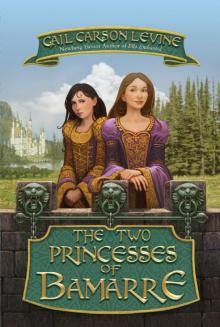 The Two Princesses of Bamarre
The Two Princesses of Bamarre Dave at Night
Dave at Night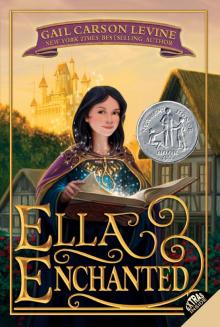 Ella Enchanted
Ella Enchanted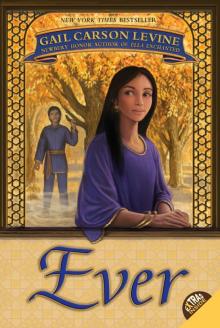 Ever
Ever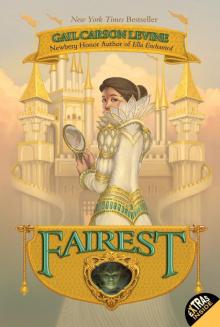 Fairest
Fairest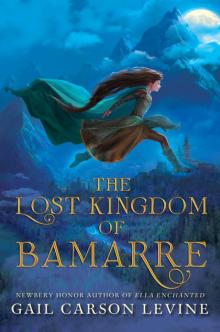 The Lost Kingdom of Bamarre
The Lost Kingdom of Bamarre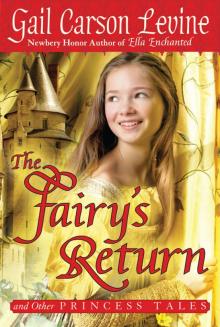 The Fairy's Return and Other Princess Tales
The Fairy's Return and Other Princess Tales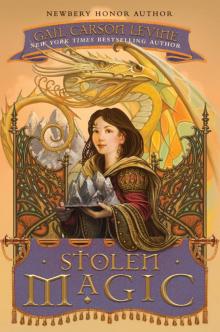 Stolen Magic
Stolen Magic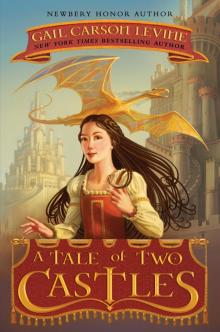 A Tale of Two Castles
A Tale of Two Castles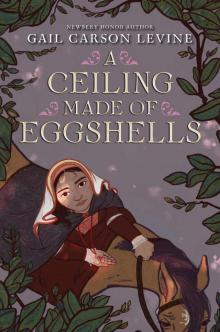 A Ceiling Made of Eggshells
A Ceiling Made of Eggshells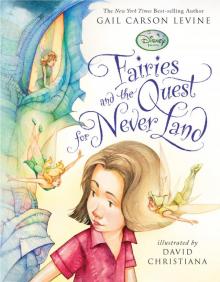 Fairies and the Quest for Never Land
Fairies and the Quest for Never Land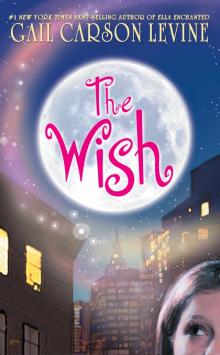 The Wish
The Wish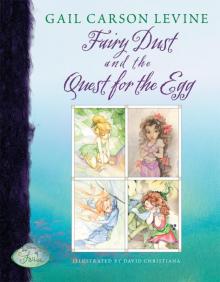 Fairy Dust and the Quest for the Egg
Fairy Dust and the Quest for the Egg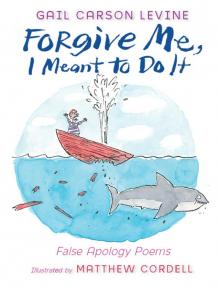 Forgive Me, I Meant to Do It: False Apology Poems
Forgive Me, I Meant to Do It: False Apology Poems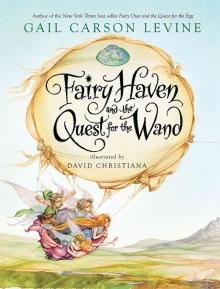 Fairy Haven and the Quest for the Wand
Fairy Haven and the Quest for the Wand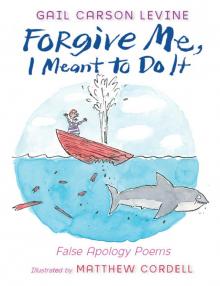 Forgive Me, I Meant to Do It
Forgive Me, I Meant to Do It